Is It Safe to Eat Blackberry Seeds
Blackberry seeds are safe to eat and offer numerous health benefits. You'll find them rich in essential fatty acids, fiber, and antioxidants. When you consume whole blackberries, you're getting the full nutritional package. The seeds are digestible for most people, though those with sensitive digestive systems may experience mild discomfort due to their high fiber content. While blackberry seeds contain trace amounts of cyanogenic glycosides, they pose no significant risk when consumed as part of the whole fruit. It's important to wash blackberries thoroughly before eating to remove any potential contaminants. If you have specific digestive concerns or allergies, consult your healthcare provider. The more you understand about these tiny powerhouses, the better you can appreciate their role in your diet.
This post may contain affiliate links. If you make a purchase through these links, I may earn a commission at no additional cost to you. Additionally, portions of this post may be generated using artificial intelligence (AI) technology. While we strive for accuracy, please be aware that AI-generated content may not always be perfect and should be fact-checked when necessary.
The Spatula Scoops
- Blackberry seeds are generally safe to eat and provide essential nutrients like omega-3 fatty acids, fiber, and antioxidants.
- The body's natural digestive processes can handle blackberry seeds, with some passing through the digestive tract intact.
- Individuals with sensitive digestive systems or conditions like diverticulitis may experience discomfort from the hard seeds.
- Blackberry seeds contain small amounts of cyanogenic glycosides, but these are not harmful in normal consumption.
- Thorough washing of blackberries is important for food safety, removing potential contaminants before eating.
Nutritional Profile of Blackberry Seeds
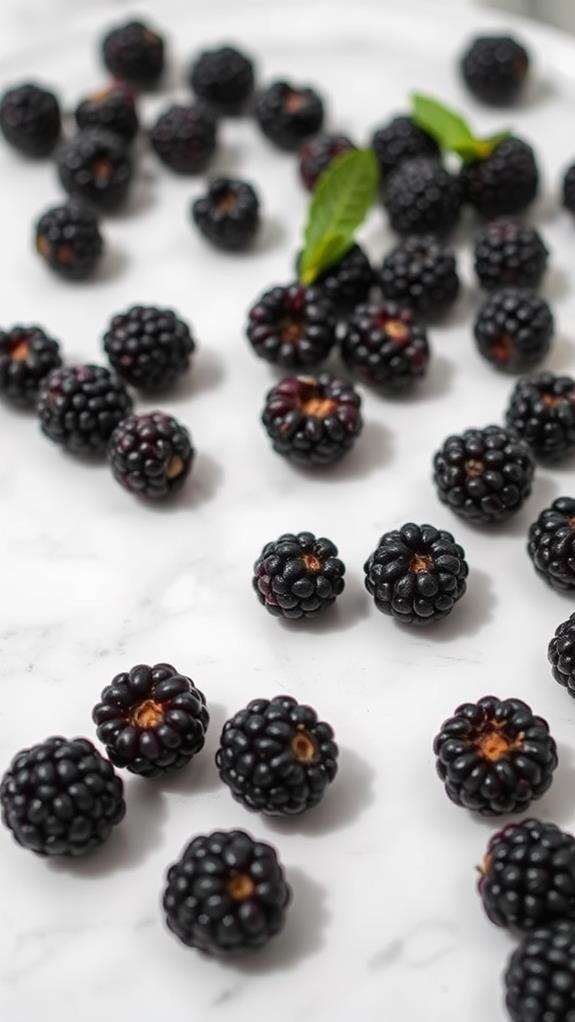
Blackberry seeds pack a nutritional punch despite their small size. You'll find these tiny powerhouses are rich in essential fatty acids, particularly omega-3 and omega-6. These fats play indispensable roles in heart health, brain function, and reducing inflammation in your body. Much like organic cacao powder, blackberry seeds are packed with antioxidants and offer numerous health benefits without added sugars.
The seeds also contain a substantial amount of fiber, which aids digestion and helps maintain a healthy gut microbiome. You'll benefit from their protein content, too, as it contributes to muscle repair and growth. Blackberry seeds are a good source of vitamins and minerals, including vitamin E, an antioxidant that supports immune function and skin health.
One of the most notable components of blackberry seeds is ellagic acid, a polyphenol with potent antioxidant properties. This compound has been studied for its potential anti-cancer effects and ability to combat oxidative stress. You'll also find lignans in these seeds, which are plant compounds that may help reduce the risk of certain chronic diseases.
When you consume blackberries whole, you're getting all these nutritional benefits from the seeds. They're perfectly safe to eat and contribute significantly to the overall nutritional value of the fruit.
Health Benefits of Consuming Seeds
Seeds, nature's tiny powerhouses, offer a wealth of health benefits when consumed regularly. When you include seeds in your diet, you're tapping into a concentrated source of nutrients. They're packed with essential fatty acids, protein, fiber, vitamins, and minerals that can support your overall health.
Here's a quick overview of some common seeds and their benefits:
| Seed Type | Key Nutrients | Health Benefits |
|---|---|---|
| Chia | Omega-3, Fiber | Heart health, Digestion |
| Flax | Lignans, ALA | Hormone balance, Brain function |
| Pumpkin | Zinc, Magnesium | Immune support, Sleep quality |
| Sunflower | Vitamin E, Selenium | Antioxidant protection, Skin health |
| Hemp | Complete protein, GLA | Inflammation reduction, Hormone balance |
Potential Risks and Considerations
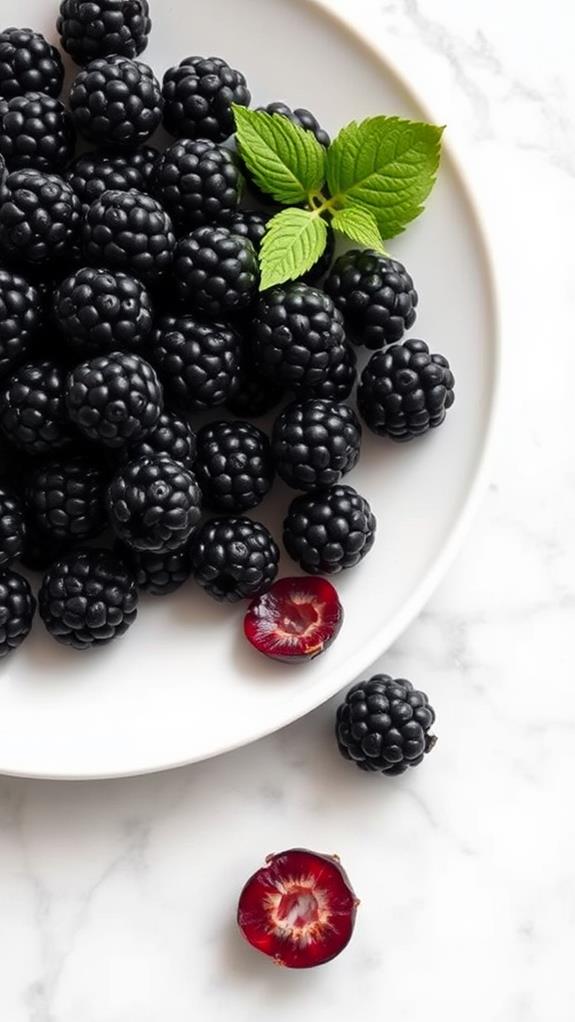
While generally safe, consuming blackberry seeds does come with a few potential risks and deliberations. If you have a sensitive digestive system, you might experience some discomfort due to the seeds' high fiber content. This can lead to bloating, gas, or stomach cramps in some individuals. Some people find that using whole cloves in teas or beverages can help alleviate digestive discomfort, as they offer various health benefits.
Another factor to ponder is the presence of cyanogenic glycosides in blackberry seeds. These compounds can release small amounts of cyanide when digested. However, the levels are typically too low to cause harm in normal consumption. Still, if you're eating large quantities of blackberry seeds, it's worth being aware of this potential risk.
For those with diverticulitis or other digestive disorders, the small, hard seeds might irritate the intestinal lining. If you have any pre-existing digestive conditions, it's best to consult with your healthcare provider before incorporating significant amounts of blackberry seeds into your diet.
Lastly, be mindful of potential allergic reactions. While rare, some people may be allergic to blackberry seeds. If you experience any unusual symptoms after consuming them, such as itching or swelling, discontinue use and seek medical advice.
Digestibility of Blackberry Seeds
Many people wonder about how well their bodies can process blackberry seeds. The digestibility of these tiny seeds is generally not a concern for most individuals. Your digestive system is well-equipped to handle the small, hard seeds found in blackberries. As you chew and swallow blackberries, your body's natural digestive processes begin to break down the fruit's flesh and seeds. Similar to Brussels sprouts preparation, thorough washing of blackberries is essential for food safety, removing potential contaminants before consumption.
The seeds contain fiber, which can aid in digestion and promote gut health. However, it's worth noting that your body may not fully break down all the seeds. Some may pass through your digestive tract intact. This is normal and doesn't pose a health risk for most people. The seeds' outer coating is tough, which can make them resistant to complete digestion.
If you have specific digestive concerns or conditions, such as diverticulitis or inflammatory bowel disease, you might want to be more cautious about consuming seeds. In these cases, it's best to consult with your healthcare provider about whether you should limit or avoid blackberry seeds in your diet.
Comparison With Other Berry Seeds
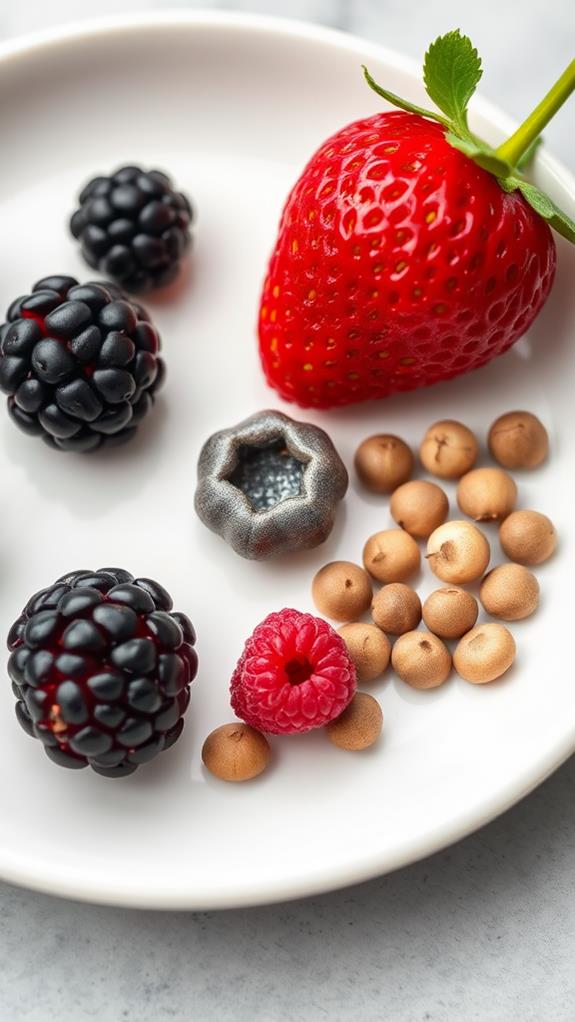
Blackberry seeds share similarities with other berry seeds, but they also have unique characteristics. When you compare them to seeds from strawberries, raspberries, and blueberries, you'll notice some differences in size, texture, and digestibility. Much like pink peppercorns, blackberry seeds offer a distinct flavor profile and can add a unique touch to various dishes.
Strawberry seeds are tiny and easily digestible, often going unnoticed when you eat the fruit. Raspberry seeds are slightly larger and crunchier, but still relatively small compared to blackberry seeds. Blueberry seeds are even smaller and softer, making them almost imperceptible when consumed.
Blackberry seeds, on the other hand, are larger and harder than most other berry seeds. They're more noticeable when you're eating the fruit and can sometimes get stuck in your teeth. This characteristic makes them less digestible than their berry counterparts.
In terms of nutritional content, blackberry seeds are rich in omega-3 fatty acids and fiber, similar to raspberry seeds. However, they contain higher amounts of these nutrients due to their larger size. While all berry seeds offer some health benefits, blackberry seeds stand out for their potential to provide more substantial nutritional value per seed.
Culinary Uses of Blackberry Seeds
You might be surprised to learn that blackberry seeds have several culinary applications beyond just eating them whole. Blackberry seed flour, a finely ground powder made from the seeds, can be used as a nutritious addition to baked goods or smoothies. For those interested in natural oils, blackberry seed oil can be extracted and used in cooking or as a flavoring agent, while whole seeds can serve as an interesting textural garnish for various dishes.
Blackberry Seed Flour
A rising trend in the culinary world is the use of blackberry seed flour. This nutrient-dense ingredient is made by grinding dried blackberry seeds into a fine powder. You'll find it's packed with fiber, protein, and omega-3 fatty acids, making it a healthy addition to your baking repertoire.
When incorporating blackberry seed flour into your recipes, you'll need to make some adjustments. It's not a direct substitute for wheat flour due to its unique properties. Here's a quick guide to help you get started:
| Recipe Type | Substitution Ratio | Notes |
|---|---|---|
| Bread | 10-15% | Adds nutty flavor |
| Cookies | 20-25% | Increases crunchiness |
| Muffins | 15-20% | Enhances moisture |
| Pancakes | 25-30% | Boosts nutritional value |
You'll notice that blackberry seed flour adds a subtle earthy flavor and slight texture to your baked goods. It's also gluten-free, making it suitable for those with celiac disease or gluten sensitivities. When using this flour, be sure to store it in an airtight container in a cool, dry place to maintain its freshness and nutritional benefits.
Seed Oil Extraction
Another valuable product derived from blackberry seeds is their oil. You can extract this oil through various methods, including cold-pressing and solvent extraction. The cold-pressing technique involves mechanically squeezing the seeds to release their oil without using heat or chemicals. This process helps safeguard the oil's nutritional value and natural properties.
Blackberry seed oil is rich in omega-3 and omega-6 fatty acids, as well as vitamin E. You'll find it's becoming increasingly popular in the cosmetic and culinary industries. In skincare, it's prized for its moisturizing and anti-aging properties. When it comes to cooking, you can use the oil as a finishing touch for salads or cold dishes.
The extraction process typically yields a small amount of oil, which contributes to its higher price point. If you're interested in trying blackberry seed oil, you'll likely find it in health food stores or specialized online retailers. Remember, a little goes a long way due to its concentrated nature. When purchasing, look for cold-pressed, unrefined options to guarantee you're getting the most benefits from this nutrient-dense oil.
Whole Seed Garnishes
Blackberry seeds can serve as an unexpected and delightful garnish in various culinary applications. You'll find that these tiny, crunchy seeds add texture and visual interest to a wide range of dishes. They're particularly effective when sprinkled atop desserts, salads, or smoothie bowls. Their subtle nutty flavor complements both sweet and savory recipes, making them a versatile addition to your culinary toolkit.
To help you visualize the potential uses of blackberry seeds as garnishes, examine this table:
| Dish Type | Garnish Method | Flavor Profile |
|---|---|---|
| Desserts | Sprinkled | Sweet, nutty |
| Salads | Mixed in | Earthy, tangy |
| Smoothies | Blended | Subtle, rich |
When using blackberry seeds as garnishes, it's important to assess the overall flavor balance of your dish. You'll want to use them sparingly, as their texture can be quite noticeable. Remember that these seeds are rich in antioxidants and omega-3 fatty acids, so they're not just a pretty addition but also a nutritious one. Experimenting with whole seed garnishes can elevate your culinary creations and impress your guests with your attention to detail.
Ecological Role of Seeds
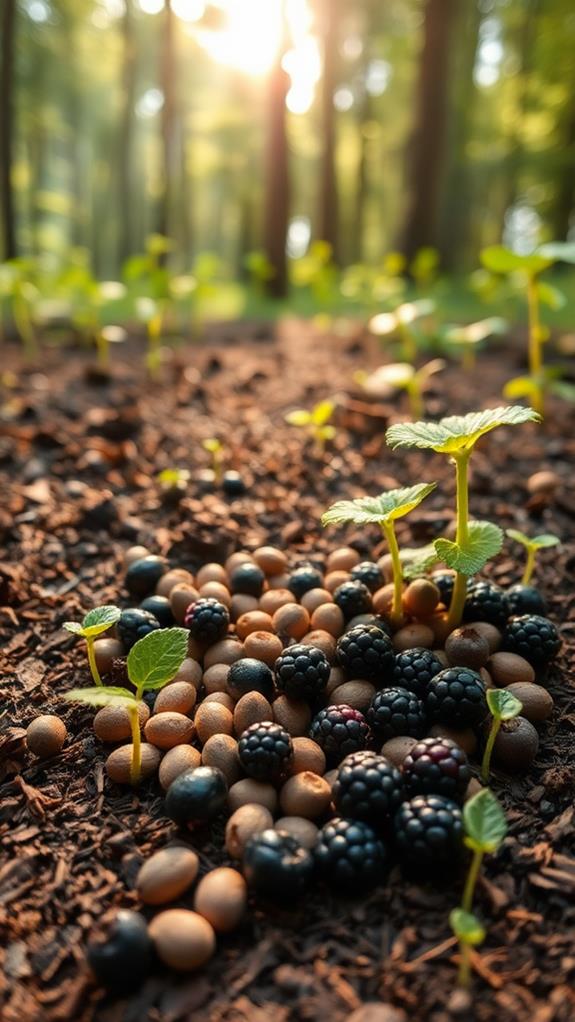
Seeds play an essential role in the ecological cycle of blackberry plants. When you consume blackberries, you're participating in a natural process that's been ongoing for millennia. The seeds you ingest often pass through your digestive system intact, and when excreted, they can potentially germinate and grow into new plants.
This seed dispersal mechanism, known as endozoochory, is pivotal for blackberry propagation. Birds, mammals, and even humans act as seed dispersers, helping to spread blackberry plants across diverse landscapes. It's nature's way of ensuring genetic diversity and colonizing new territories.
The seeds themselves are packed with nutrients that support the growth of new plants. They're designed to withstand harsh conditions and can remain dormant for extended periods until environmental conditions are favorable for germination. This adaptability is fundamental to the blackberry's success as a species.
In the context of content creation and SEO, understanding the ecological role of blackberry seeds can provide valuable long-tail keywords and niche topics. It's a perfect example of how in-depth, scientific content can improve your website's authority and search engine rankings.
Blackberry Seed Oil Applications
Culinary enthusiasts and health-conscious consumers are increasingly turning to blackberry seed oil for its versatile applications. You'll find this nutrient-rich oil used in various ways, from cooking to skincare. In the kitchen, you can drizzle it over salads or use it as a finishing oil for grilled meats and vegetables. Its nutty, slightly fruity flavor adds depth to dishes without overpowering other ingredients.
For skincare, blackberry seed oil is prized for its moisturizing and anti-aging properties. You can apply it directly to your skin or mix it with other carrier oils for a customized blend. It's rich in antioxidants and omega-3 fatty acids, which may help reduce inflammation and protect against free radical damage.
In the health and wellness sector, you'll find blackberry seed oil in supplements and nutraceuticals. It's often touted for its potential benefits in supporting heart health and improving skin elasticity. Some companies are even incorporating it into hair care products, claiming it can strengthen and nourish hair follicles.
When shopping for blackberry seed oil, look for cold-pressed, organic varieties to guarantee maximum nutritional benefits and purity.
Allergies and Sensitivities
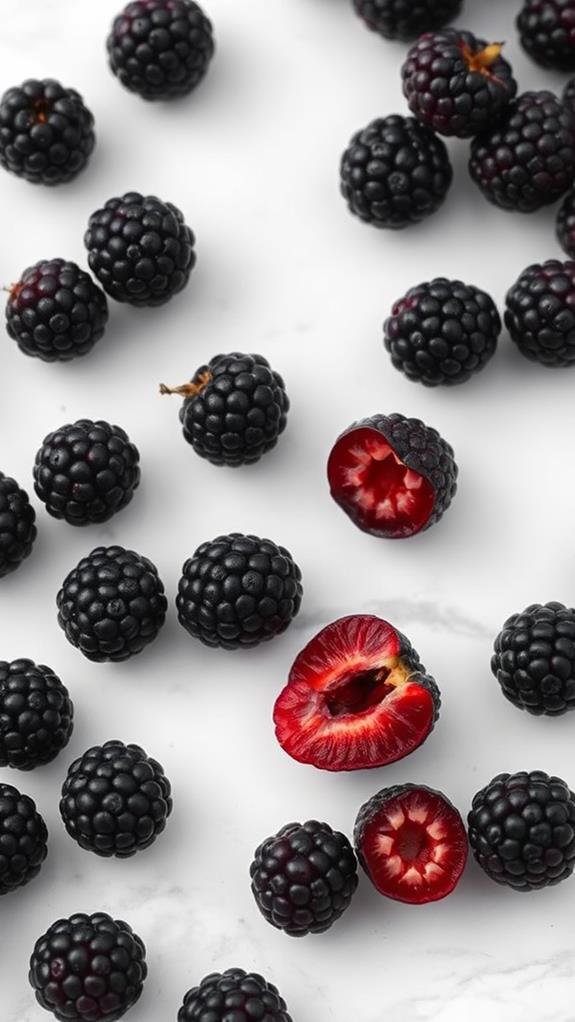
While generally safe for most people, blackberry seeds can trigger allergic reactions in some individuals. If you have a known allergy to other berries or fruits in the Rosaceae family, you may be more susceptible to a blackberry seed allergy. It is paramount to be aware of potential symptoms, which can range from mild to severe.
Common signs of a blackberry seed allergy include:
- Itching or tingling in the mouth
- Swelling of the lips, tongue, or throat
- Hives or skin rashes
- Difficulty breathing or wheezing
If you experience any of these symptoms after consuming blackberry seeds, it is vital to stop eating them and consult a healthcare professional. They may recommend allergy testing to confirm the diagnosis and provide guidance on managing your condition.
For those with sensitive digestive systems, blackberry seeds might cause mild gastrointestinal discomfort due to their high fiber content. If you notice any persistent digestive issues after eating blackberries, consider removing the seeds or opting for seedless varieties. Remember, everyone's body reacts differently, so it is important to listen to your own and make informed decisions about your diet.
Sustainable Harvesting Practices
When you're gathering blackberries, you'll need to evaluate whether you're harvesting from wild or cultivated plants, as each requires different approaches. It's essential to use proper picking techniques to avoid damaging the plants or surrounding ecosystem. Remember to leave some berries behind for wildlife, as these fruits are an important food source for many animals in the area.
Wild vs. Cultivated Harvesting
Blackberry enthusiasts often face a choice between wild foraging and cultivated harvesting. When you're deciding which method to pursue, consider these key differences:
- Wild blackberries grow naturally without human intervention
- Cultivated blackberries are grown in controlled environments
- Foraging requires knowledge of local ecosystems and plant identification
- Farmed berries are typically more accessible and consistent in quality
Wild harvesting offers the thrill of discovery and potentially more diverse flavors. You'll need to be aware of local regulations and practice sustainable foraging techniques to protect natural habitats. On the other hand, cultivated blackberries provide a reliable yield and are often larger and sweeter than their wild counterparts.
If you're interested in SEO-friendly content creation, wild harvesting can provide unique, long-tail keywords that may attract niche audiences. Terms like "urban foraging" or "wild blackberry identification" can boost your content's visibility. Conversely, content about cultivated blackberries might focus on "organic farming practices" or "blackberry varieties," appealing to a broader audience interested in gardening or agriculture. Whichever method you choose, understanding the pros and cons will help you make an informed decision and create more engaging content.
Proper Picking Techniques
Sustainability is key when it comes to harvesting blackberries. Whether you're picking from wild bushes or cultivated plants, it's essential to employ proper techniques that preserve the plant's health and safeguard future harvests. When you're ready to pick, look for berries that are fully ripe and come off the stem easily with a gentle tug. Don't force unripe berries, as this can damage the plant.
As you harvest, be mindful of your surroundings. Avoid trampling nearby vegetation or disturbing wildlife habitats. Use a container that allows air circulation to prevent the berries from getting crushed. It's best to pick in the morning when the fruits are cool and firm.
Remember to leave some berries on the plant. This practice, known as "selective harvesting," allows for natural seed dispersal and supports local ecosystems. If you're picking from public land, check local regulations to ensure you're allowed to harvest and adhere to any quantity limits.
Leave Some for Wildlife
As you gather your bounty of blackberries, it's indispensable to remember that you're not the only one who relies on these delicious fruits. Wildlife, including birds and small mammals, depend on blackberries for sustenance. To practice sustainable harvesting, consider the following guidelines:
- Leave at least 1/3 of the ripe berries on each bush
- Avoid picking from areas with signs of animal activity
- Rotate your picking locations to prevent overexploitation
- Refrain from harvesting berries close to the ground, as these are often accessed by smaller creatures
By adhering to these principles, you'll guarantee that local ecosystems remain balanced while still enjoying your share of the harvest. Remember, blackberry bushes serve as pivotal habitats for various species, providing food and shelter throughout the year.
When foraging, be mindful of your impact on the environment. Stick to established trails to minimize soil erosion and avoid trampling other plants. If you're picking on private property, always obtain permission first. By practicing responsible harvesting techniques, you'll contribute to the long-term health of blackberry populations and support biodiversity in your area. This approach aligns with the concept of "evergreen content" in SEO, as sustainable practices ensure a consistent supply of berries for years to come.
Frequently Asked Questions
Can Blackberry Seeds Be Used for Skin Care Products?
You can indeed use blackberry seeds in skin care products. They're rich in antioxidants and essential fatty acids, which can benefit your skin. When ground into a fine powder, blackberry seeds make an excellent natural exfoliant. They're often incorporated into facial scrubs, body polishes, and moisturizing creams. The oil extracted from these seeds is also used in various skincare formulations due to its nourishing properties. However, always patch test new products to verify you don't have any adverse reactions.
Do Blackberry Seeds Have Any Impact on Dental Health?
You might be chewing on this question, but blackberry seeds don't have a significant impact on dental health. They're small and soft, so they won't crack your teeth or damage enamel. However, like other seeds, they can get stuck between teeth, so you'll want to floss after eating them. On the plus side, blackberries are rich in antioxidants, which may help fight gum disease. Just remember to brush and floss regularly to keep your pearly whites in top shape.
How Long Can Blackberry Seeds Be Stored?
You can store blackberry seeds for quite a long time if you handle them properly. After extracting and cleaning the seeds, make sure they're completely dry. Once dried, place them in an airtight container or sealed plastic bag. Store them in a cool, dark place, ideally at temperatures between 32-41°F (0-5°C). Under these conditions, blackberry seeds can remain viable for up to 5 years. However, germination rates may decrease over time, so it's best to use them within 2-3 years for ideal results.
Are There Any Cultural or Historical Uses for Blackberry Seeds?
You might be surprised to learn that blackberry seeds have been used for centuries, long before the internet's invention. Historically, Native American tribes utilized them for medicinal purposes, treating digestive issues and sore throats. In some cultures, they've been ground into flour for baking. Today, you'll find blackberry seed oil in cosmetics, valued for its antioxidant properties. Some herbalists still recommend them for various health benefits, though scientific evidence is limited. You can even find recipes incorporating whole blackberry seeds for added texture in modern cuisine.
Can Blackberry Seeds Be Sprouted for Microgreens?
Yes, you can sprout blackberry seeds for microgreens. To do this, you'll need to start with fresh, clean seeds. Soak them overnight, then spread them on a moistened growing medium. Keep them in a warm, dark place and mist regularly. After about 7-10 days, you'll see tiny sprouts emerge. Once they've grown a bit larger, expose them to indirect sunlight. Harvest your blackberry microgreens when they're about 2-3 inches tall, typically within 2-3 weeks.
Conclusion
You've made it through the blackberry seed saga, and you're still standing. Congratulations! You've learned that these tiny terrors aren't just safe to eat, they're practically superfoods. So go ahead, embrace your inner seed-eater. Just don't be surprised if you start sprouting blackberry bushes from your ears. Remember, with great seed consumption comes great responsibility. Now you're armed with knowledge, ready to face the wild world of berry seeds. Eat wisely, my friend.





